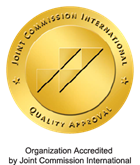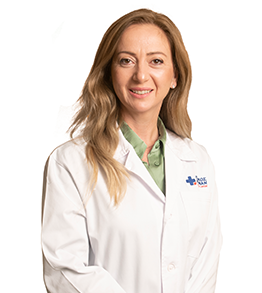
Metabolism & Diabetes Center
Guided by the most up-to-date international practices, Henry Dunant Hospital Center has developed the Metabolism and Diabetes Center. It is a model center that offers and guarantees effective diagnosis and treatment of a wide range of metabolic disorders using modern infrastructure.
The new Center’s philosophy is based on the overall (global) approach to metabolic disorders, which enables an integrated assessment of individual metabolic risk and appropriate, preventive or therapeutic measures. An important parameter of its operation is patient longitudinal follow up.
The Center also includes the Department of Nutrition and Dietetics, which provides high quality services, with its highly specialized personnel and the latest technological equipment. Dieticians aim to solve problems of obesity and eating disorders and issues regarding the treatment of diet-related clinical cases. They ensure maximum quality nutrition services by employing the most up-to-date scientific resources and most modern knowledge. They guide patients to gain control of their body weight, changing their daily lives and adopting a healthy lifestyle, always following a personalized diet program tailored to their own needs. After all, when following a diet program, the goal is not only body weight - fat reduction but also body weight - fat maintenance.
Telephone: (+30)210-6972226
Call Center: (+30)210-6972000
Email: diabetes@dunant.gr
In charge: Georgios Piaditis
Activities
Diabetes Mellitus
- Diagnosis of pre-diabetes (borderline diabetes) or diabetes mellitus
- Clinical assessment of the adverse effects of increased glucose (sugar) levels on body organs.
- Laboratory assessment and diagnosis of other metabolic disorders associated with increased sugar levels.
- Patient training regarding the nature of glucose disorder and the ways to monitor and treat the disorder not only on a daily basis, but also in emergency situations (travel, illness).
- Training patients to adopt a proper (based on their situation) diet and exercise
- Administration of appropriate medication.
- Training on how to use medicines that are administered by injection
- Training on how to prevent and treat hypoglycemia
- Regular foot care training.
- Comprehensive treatment of diabetic foot and diabetic ulcers.
- Assessment of the effects of diabetes on heart and blood vessels and treatment in collaboration with the Department of Cardiology and Vascular Surgery Department of the Henry Dunant Hospital Center
- Diagnosis of diabetes eye complications (retinopathy, macular lesions, etc.) and treatment by the Henry Dunant Hospital Center’s Department of Ophthalmology
- Diagnosis of diabetes kidney complications and treatment in collaboration with the Henry Dunant Hospital Center’s Nephrology Department
- Diagnosis and treatment of diabetic neuropathy.
- Teaching small groups of patients on issues related to diabetes and its management after planning.
- To Investigate and identify causes (other than diabetes) that are responsible for the manifestation of hypoglycemia and their treatment.
Obesity
- Comprehensive clinical assessment of the obese individual and exclusion of medical conditions
- Analysis of nutritional behavior, physical activity and body composition with state-of-the-art machines
- Appropriate nutrition program planned by a nutritionist
- Regular monitoring at the Center as well as psychological support
- In selected cases, surgical treatment of obesity in the specialized department of the Henry Dunant Hospital Center
- Postoperative medical and nutritional care
Assessment/monitoring of increased cholesterol and triglyceride levels
- Assessment of lipid metabolism disorder (hypercholesterolemia and/or hypertriglyceridemia) always as a function of the assessment of the overall individual metabolic risk
- Exclusion of endocrine disorders (hypothyroidism, diabetes, etc.) responsible for lipid disorders
- Dietary and pharmacological treatment of lipid disorders
Calcium metabolism disorders
- Investigation - diagnosis of endocrine causes responsible for the abnormal calcium increase (hypercalcemia) or decrease (hypocalcemia) and their treatment
- Diagnosis and treatment of Vitamin D deficiency (hypovitaminosis D)
Osteoporosis
Osteoporosis is a metabolic bone disorder, it affects a significant part of the population and is a scientific field that the Center is actively involved since it features the laboratory infrastructure and medical experience not only to effectively diagnose and investigate the causes of this condition but also to treat it. In particular:
- The Radiology Department examines the presence of severe osteopenia or osteoporosis by bone density measurement and investigates the presence of osteoporotic fractures
- By taking a detailed patient history the department examines the occurrence of osteoporotic fracture in parents or other ascendants. It also investigates the presence of diseases and drug intake responsible for the occurrence of osteoporosis
- A detailed history is taken regarding dietary habits, the presence of nutrition disorders and adequate daily dietary calcium intake
- The department examines the presence of endocrine disorders contributing to calcium loss from bones and the induction of osteoporosis
- The department assesses vitamin D sufficiency in the body
- Administration of dietary treatment and medication, as appropriate
- Long-term follow-up, evaluation of the course of treatment and therapeutic intervention where deemed necessary.




